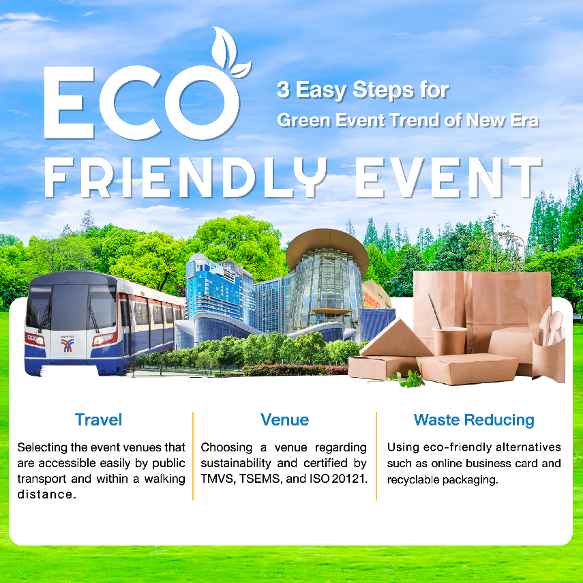“Eco-Friendly Event” – 3 Easy Steps for Green Event Trend of New Era

Nowadays, people from all over the world are getting more concern and interested in environment than before. Many industrial sectors begin to adapt themselves for the current “Eco-Friendly Trend” of the new era to promptly meet the desires of their target groups. Event Industry and the organizers start to figure out how to organize the events to be well-responsive to eco-friendly trend in order to stay on world’s trends and attract more attendees to the events.
Let us give you an example of an eco-friendly event that many people are probably familiar with its famous name which is “Olympics Games Tokyo 2020”, organized in the last July in Tokyo, Japan. This event can be considered as a huge success since it has become a model and an inspiration for other organizers who would like to host eco-friendly events. The Olympics 2020 is multi-dimensionally planned by using electric vehicles, having medals and podiums made from recycled materials, and creating an athletic village constructed with reusable materials which can be demolished and reprocessed later. Today, we would like to invite you to learn the easy ways to organize an eco-friendly event by following only these 3 simple steps.
Travel - a starting point of eco-friendliness
The organizers should select the event venues where they are easily accessible by public transport like trains or buses to reduce the use of personal vehicles. However, if the venue is located outside of town, the organizers can arrange a shuttle bus service to pick the participants up as well as drop them off at the nearest BTS skytrain or MRT station and publicize all travel information that have been planned to the participants. The organizers can also recommend hotels within a walking distance of the venues or launch a co-promotion with public transport services to facilitate the attendees and gain more interests and engagement from them.
Choose a venue that regards sustainability
The organizers should choose a venue that gives an importance on sustainability and is certified by industry standards such as TMVS (Thailand MICE Venue Standard), TSEMS (Thailand Sustainable Event Management Standard), and the venues’ environmental policy which is also one of the criteria for these standards. Some examples of the policy can be selecting low carbon emission policy, electricity and water-saving policy, etc. Moreover, there is ISO 20121, a standard which specifies requirements for an event sustainability management system. Many venues in Thailand are accredited by ISO 20121 including Royal Paragon Hall, Le Meridien Bangkok, the Athenee Hotel Bangkok, Chiang Mai Hall, and The 60th Anniversary of His Majesty the King’s Accession to the Throne International Convention Center) (ICC Hat Yai), etc. These venues are more than ready to cooperate with the organizers in holding environmentally-friendly events.
Create waste-reducing guidelines for all stages of events
Let’s start with online registration, encouragement on the attendees to use digital business cards, and an upload of all information into online channels to reduce the use of paper. Also, the attendees’ food and snacks packages should be recyclable and the event souvenirs should be an environmentally-friendly by choosing to distribute portable food boxes or water tumblers. Additionally, reducing food waste plan should be arranged as well by donating the surplus to people in need. As in this step, you can contact Scholars of Sustenance Thailand (SOS Thailand) to coordinate with them so that they can handle surplus food collection from the business sectors and deliver it directly to those in need.
Just follow these 3 simple steps, then you can organize environmentally-friendly events to be well-responsive to the current eco-friendly trend and meet target groups’ demand in this era. TCEB would like to invite you all to be a part of organizing sustainable environmentally-friendly events.
